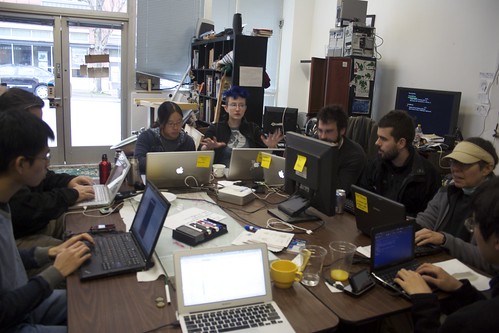Random Hacks of Kindness was the first weekend of December, OpenDoor Hack-A-Thon this past weekend. Many amazing things were built, and we’ll be continuing endeavors on both counts. What I’m going to talk about now though is not the code or the implementation, but the social dynamics and what we can Do Better for hackathons.
The thons that I have participated with have, as a default, been intimidating. I hope this is not everyone’s experience, but it certainly is mine. I have limited coding experience, and a time-crunch competition is no time to show up and say “but I can learn!” I often offer to keep track of online communications, do research, layout order-of-use and menus and the like, and brew coffee. On occasion, while someone is waiting for code to compile or someone else to finish a contingency task, they’ll teach me about what they’ve written. I learn a lot and have a great time.
There is a continuing problem of “the n00b and the clue-by-four”. This is happens when someone shows up with some combination of the following two features : arriving late1 and/or having extremely limited ability2. It is an issue I have yet to see addressed well. Incorporating a better way of guiding efforts of the thons would be beneficial to all participants, n00bs or l33t. So, in talking with James and Jordan and Strand, we’ve been thinking about the following solutions:
- basic document (link to what the event is about, communication channels, documents created for event
- IRC bots (check-in times, auto-answer basic questions, DM those joining the room with above doc, send log of IRC discussion
- gamification (points towards what people should be working on, time allotments for each stage, etc)
So… I’m super excited to start the hackathons at Jigsaw third weekends in 2011. What would you do? What sorts of guidance do you need when participating in a group event where the details evolve as everyone works together, and few people know each other? We’re intending on having classes the Wednesday before, so people feel a bit more capable in their skills, or create a new skillset.
1. Problems and their potential solutions are discussed either before the hackathon or during its first breaths. Courses chosen are based on the skillsets of available people – to include a step which involves skills no one present has based on the hope that someone will walk through the door hours into the event with just that skill would be silly. This means arriving early is essential, ESPECIALLY if you haven’t been participating in the existing dialoge.
2. As stated before, time-crunch competitions are no time to pester people to teach you things, and promising you can deliver something you don’t have the skills for can be detrimental to everyone. Come, hang out, learn more, but temper your ambitions with your abilities.

